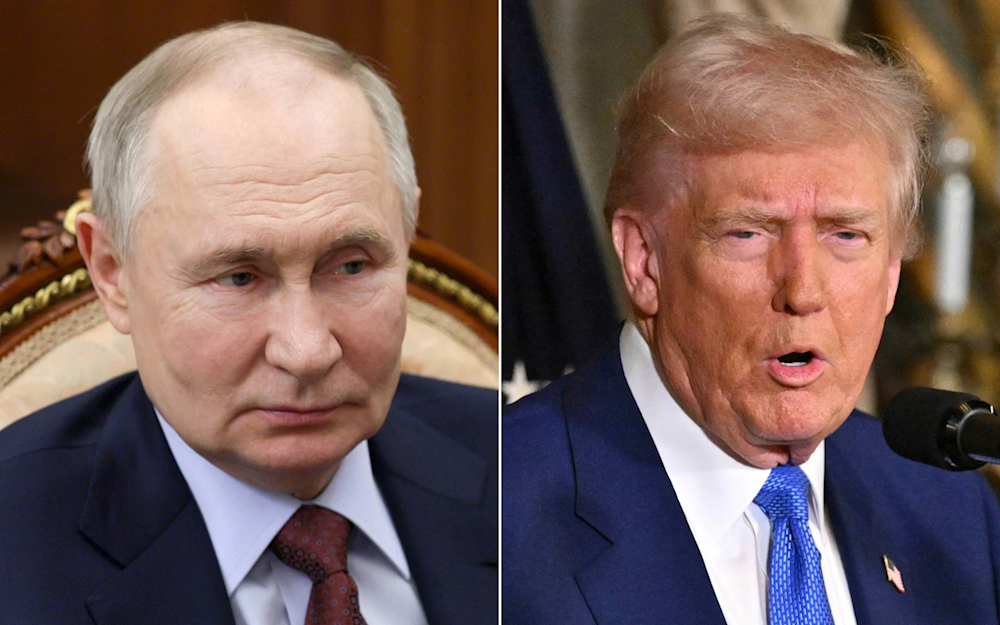FT: Trump signals retreat from Ukraine as talks with Putin resume
Following a call with Putin, Donald Trump appears to step back from US mediation in Ukraine, leaving Kiev and European allies alarmed at a shift toward Moscow.
-

Russian President Vladimir Putin (left), in Moscow, February 17, 2025, and US President Donald Trump in Palm Beach, Florida, February 18, 2025 (AP)
In a Financial Times piece, Guy Chazan, Christopher Miller, Polina Ivanova, and Henry Foy argue that US President Donald Trump is walking away from his once-promised role as peace broker in the Ukraine war, leaving Kyiv alarmed and European allies on edge.
Following a two-hour call with Russian President Vladimir Putin, Trump struck an unexpectedly optimistic tone about the future of US-Russia relations, posting on Truth Social about the prospect of "largescale TRADE" once the "catastrophic ‘bloodbath’" in Ukraine ends. According to Putin’s foreign policy advisor Yuri Ushakov, the call was so warm that neither side wanted to be the first to hang up, according to the Financial Times.
As the Financial Times co-authors argue, what startled many in Kiev and Brussels was not just the tone of the conversation, but the substance. Trump appeared to back away from applying any pressure on Moscow to end the war, and suggested the US would no longer act as mediator. Instead, he floated the idea of the Vatican stepping in, naming Pope Leo XIV as a possible host for talks.
Ukrainian President Volodymyr Zelensky was blunt in his response, warning that the US stepping aside would embolden Russia.
“The only one who benefits from that is Putin,” Zelensky said.
This shift was seen by the Financial Times authors as a pivotal moment. The president who had once vowed to end the Ukraine war on his first day in office now seemed ready to abandon that promise, and Ukraine with it.
Kiev left exposed as US signals disengagement
According to the Financial Times, the US president indicated that Washington would not apply additional pressure on Russia while the bilateral Russia-Ukraine talks continued, despite previously threatening sanctions for failure to implement a ceasefire.
Steven Pifer, a former US ambassador to Ukraine, told the Financial Times that “this call with Trump was a win for Putin,” adding that the Russian leader can now continue the war “with no additional sanctions.”
Putin’s mention of a possible “memorandum” outlining terms for peace raised confusion in Kiev. Senior Ukrainian officials said they had no knowledge of such a proposal. “Nobody knows what it is, what’s the reason for it [and] why it matters,” one official said to the Financial Times. Zelensky himself confirmed he had not been informed.
Experts weigh in on Trump’s shifting priorities
The Financial Times analysis quotes a mix of voices on Trump’s apparent policy shift. Bill Taylor, who served as US ambassador to Ukraine from 2006 to 2009, said Russia would likely prolong low-level negotiations while continuing battlefield operations. “The Russians will conduct low-level conversations, exchange various documents, and meanwhile keep on fighting,” Taylor said. “How much longer will Trump put up with all this stalling?”
While some analysts see strategic logic in Trump’s desire to step back, Peter Slezkine of the Stimson Center suggests removing the US might force direct dialogue, others see the move as a tilt toward Moscow.
Andrew Weiss of the Carnegie Endowment for International Peace was blunt, “At this point, Trump seems to see normalization of Russia-US relations as an end in itself. Everything else is subordinated to that goal.”
US Vice President JD Vance further reinforced the new US stance, saying, “We’re going to try to end it, but if we can’t… we’re not doing it anymore. This is not our war."
Russia advances as battlefield pressure grows
As diplomacy stalls, Russia is gaining ground. The Financial Times authors note that Moscow’s military has intensified pressure along the eastern front, particularly near the city of Pokrovsk and toward the Donetsk regional border.
The piece cites the Ukrainian analytical group DeepState, which reports that Russian forces are positioned within five kilometers of the administrative Donetsk boundary, while Ukrainian soldiers describe critical infrastructure coming under persistent drone attacks.
Rob Lee, a senior fellow at the Foreign Policy Research Institute, tells the Financial Times that the Kremlin likely believes it still has room to expand its gains. “Russia’s leadership likely believes they can still improve their position on the battlefield,” Lee says.
With summer approaching and weather conditions turning favorable, he warns, Russia may attempt to capture as much territory as possible before entering negotiations more seriously.

 4 Min Read
4 Min Read








